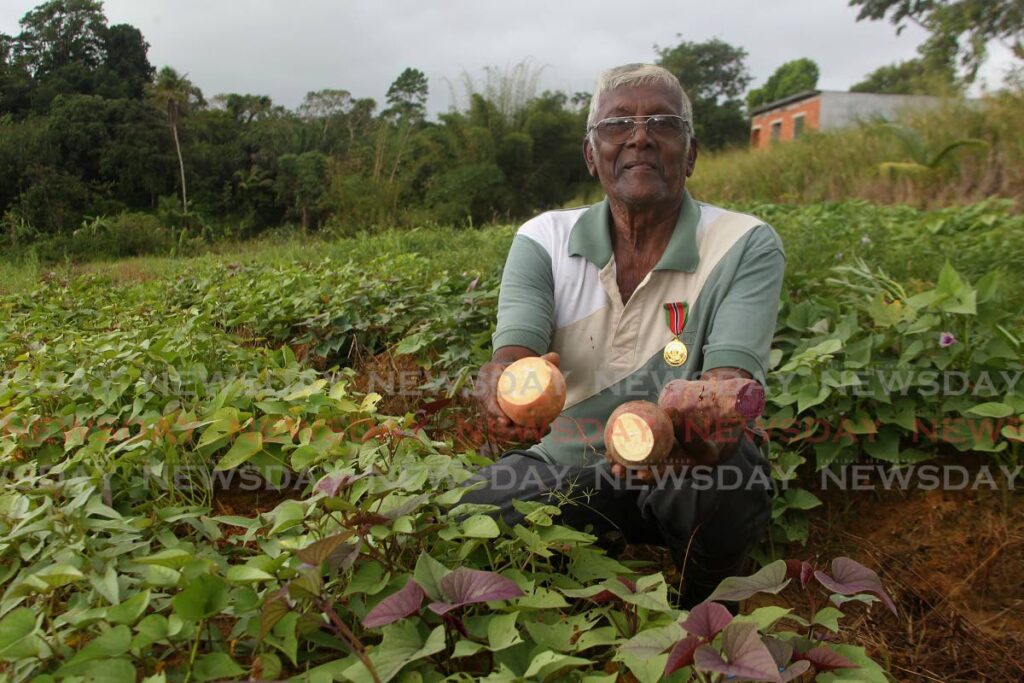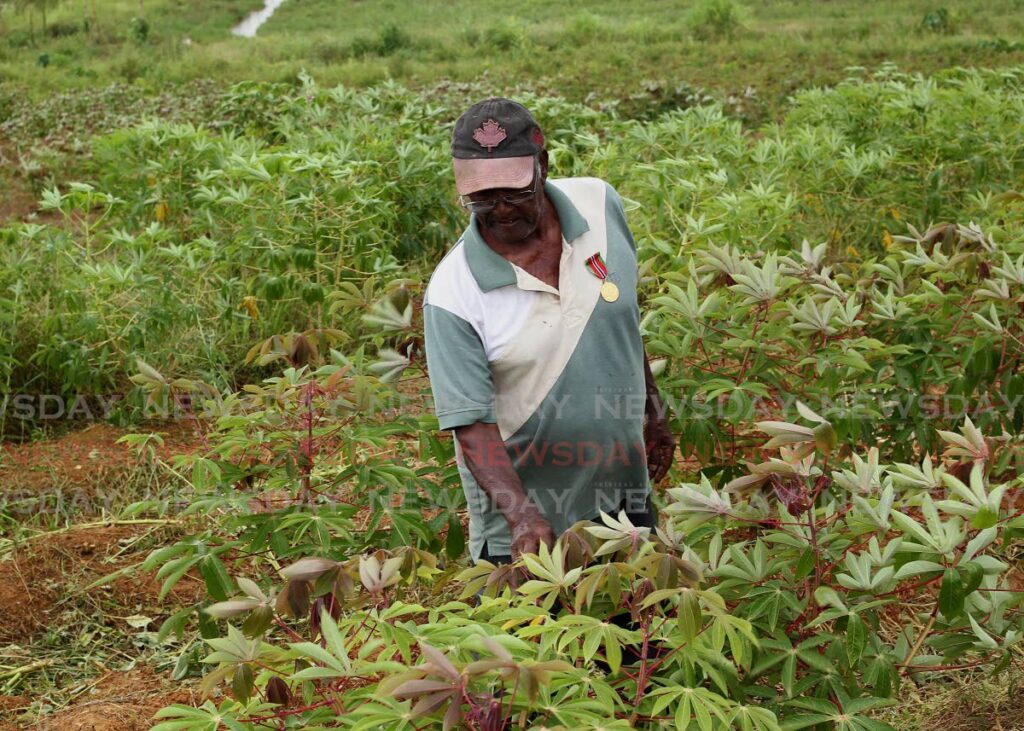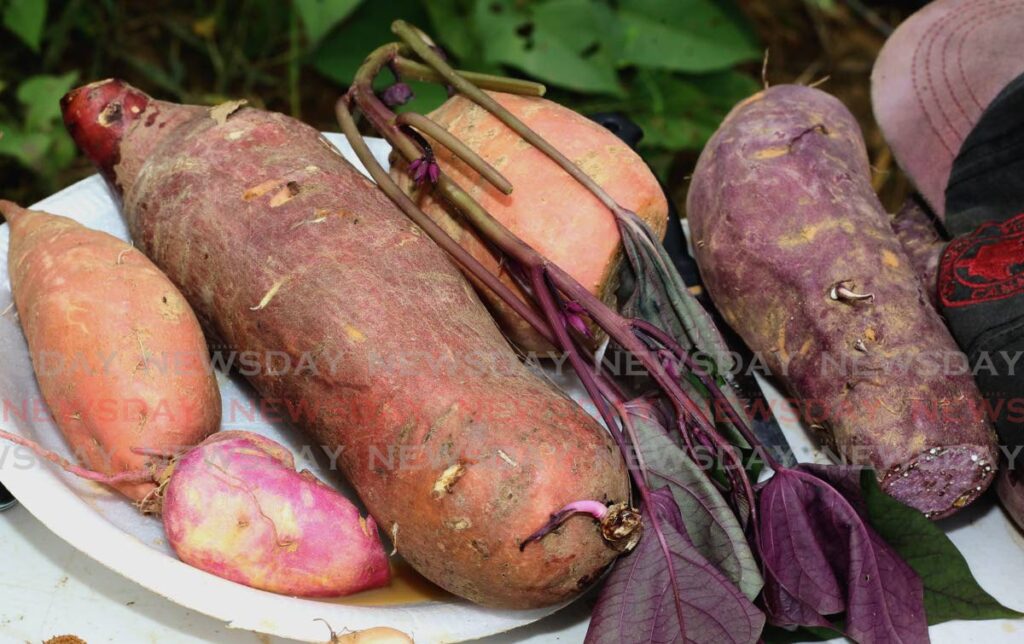Sweet potato king: Ramdeo Boondoo gets Chaconia gold for life in agriculture

Chaconia Medal (Gold) recipient Ramdeo Boondoo has earned the title of sweet potato king.
After years of experimenting with a host of varieties, he has settled at least five which he thinks are "sexy" enough for the market.
Boondoo, 73, a generational farmer, author and president of the Root Crop Farmers' Association, was awarded the nation's second highest honour on Republic Day for his contribution to the agricultural sector.
On Thursday, Newsday met with Boondoo at his sweet potato farm at Palmiste, central Trinidad as one worker was clearing bushes between beds of sprouting sweet potato vines and his son, Dinesh Boondoo, operated a tractor nearby.
From the tender age of 13, Boondoo, then a student of Todd's Road RC School had the foresight to respond to a query from his principal days after the country celebrated its independence from the United Kingdom in 1962 when he said the country could never be independent if it could not feed itself.

His focus and vision over the next 60 years has brought him many challenges and successes to become one of the foremost farmers producing high quality varieties of sweet potato, cassava, eddoes and tania among other provisions on his 60 acres under cultivation under the umbrella of Uncle Ben Green Gate Farm.
Farming has been in his blood from an early age and Boondoo spent three decades working for now defunct Caroni (1975) Ltd rising through the ranks from a cane cutter to a supervisor.
Through a process of trial and error, Boondoo cultivated a host of hybrid sweet potato seedlings until he was satisfied that the shape, texture, colour were perfect.
Buyers are attracted to goods that look good, or sexy as he prefers to describe his tubers, and his provisions are almost ready made for agro processing plants which can transform them to fries, logs or other food ready for the pot.
The traditional sweet potato cannot tolerate the drastic changes in the weather pattern, and grow to shapes that are not too appealing to the consumer, he said.
The old varieties, after they are peeled, if they are not put in water they tend to go black. With his hybrid plants this does not occur.
He said to prevent this you have to use chemicals to prevent oxidisation but it made no sense to promote healthy eating and then be using chemicals.
His purple variety has the colour of a beet root.
"You want to eat the right thing, apparently that is what I am doing, I am 73, going on 74, I think it working."
He lives by the mantra that once you do a job that you love, you do not work and recalls those words of the late Ansa McAl executive chairman emeritus Anthony Sabga during a function many years ago.
"I don't feel tired when I done here... I am psychologically happy. There is nothing like a day off for me. Plants and animals don't take days off."
Boondoo says part of his daily routine is "talking to my plants" and making sure the pesky African snails and others pests are kept at bay.
Apart for his love for his plants, Boondoo's other passion is to pass on the knowledge he has gained over the last six decades to anyone with an interest in agri-business.
"My focus is trying to spread the word to the young people. There is nothing negative in this, only positive."

Asked what type of investment is necessary to cultivate a two-acre plot, Boondoo says with $20,000 maximum someone can earn up to $20,000 in profit. A crop of sweet potato takes about eight months to a year to mature, with three months of reaping.
"Everything good takes time, it doesn't happen quickly. A lot of patience, dedication, and the driving force of passion," helps make the job easier, he says.
Asked what emotions ran though his mind as he sat on stage with other recipients on Republic Day (September 24) at the National Academy for the Performing Arts, in Port of Spain, Boondoo said it was one of his proudest moments in life.
"I was so happy that this award, the second highest in the country, was given to me. I sat there with doctors, professors, and other people who excelled in their respective fields. I sat there, I feel so proud to do that."
He said it was long overdue that a farmer be recognised for their contribution and said his journey had not been an easy one.
"Most of the times the authorities did not support you much, sometimes I was looked at as if I was crazy. I know I was not crazy, I know I was going to achieve all these things," as he pointed to his fields.
Like many other farmers, Boondoo said the issues of land tenure, flooding and praedial larceny were burdensome and hoped one day the agricultural sector will get the respect and attention it deserves.
"I don't think agriculture is getting the priority it deserves."
He said government should not get involved in growing food but focus on providing good roads, settling land tenure issues, establishing a proper functioning praedial larceny unit, dealing with invasive pests, such as the African snail and other diseases and helping reduce the cost of inputs. He was hopeful the $3 million allocated in the budget is put to good use to help eliminate or control the snails.

While he acknowledged the host of subsidies available to farmers from the government, through the Ministry of Agriculture, he said often times the reimbursement of capital investments such as machinery and other inputs are only refunded after two years.
"Farmers don't have a big pockets, so it have to be done quickly, there is too much bureaucracy."
On whether the Agricultural Development Bank has been effective in helping to finance projects for farmers, Boondoo said while there were delinquent farmers, he believed the last resort should be foreclosure of a farm.
"The ADB needs to look at every situation. During this covid situation it was not easy on the farm, I'm taking money from my pocket to put in here to pay one worker, normally I have five workers but I can't employ five workers, it is bad.
He suggested that the ADB call in their farmers, counsel them in times of crisis and advise them on options available.
"In humanity, we have to help someone up when they fall and dust off their knees and help them up. That is what ADB should be doing. ADB should not be foreclosing anybody's farm. I feel sad when I see in the newspapers farms for sale by ADB. That should be the last resort."
Asked whether he saw a future of agriculture in TT, Boondoo said Nostradamus has prophesied that the next world war will be over food and water.
"I have been saying that all the time."
He said since 2010 he had been advocating the use of cassava flour to replace wheat but no one took him on.
"Now they singing the song about cassava flour and all those kind of things."
Boondoo believes that TT farmers can produce about 50 per cent of the food the country consumes by utilising the former Caroni (1975) Ltd land. He is sceptical about the proposed venture to grow food in Guyana, questioning who will be the beneficiaries.
His advice to budding entrepreneurs is to get involved in agri-business which will not only help reduce the food import bill but also give this country food security in a time of dwindling resources worldwide.

Comments
"Sweet potato king: Ramdeo Boondoo gets Chaconia gold for life in agriculture"